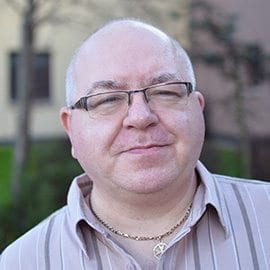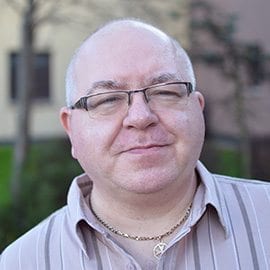Keith Gardner: “Would you like a coffee, fatty?”

An odd and somewhat pejorative question, I think you will agree? It is all about context…
A few years ago, I was out for a meal with Lynn, my wife, and at the end of the hearty three courses she asked me the question above.
Whilst I acknowledge a degree of rotundness to my physique, my vanity gene became activated as did my sense of indignation at such as slur. On seeing my huffy demeanour Lynn asked: “”what did you think I asked?” – I restated the above with my best injured party face. She replied, “No, I asked would you like a café latte…“
Being deaf has its moments, some funny, some not-so-much.
One in six people in the UK have a hearing problem (all of which are by degree and impact) – however, most people do not. In my life I have been fortunate to have a really supportive family (notwithstanding the above!), really supportive employers & colleagues and am blessed with a less than shy and retiring attitude: I am no shrinking violet.
Most of the time my disability does not hold me back, but it only takes a buzzer-entry system or a crappy PA announcement or a TV programme with no subtitles or an unannounced video-conference at a meeting or missing the hilarious one-liner while trying to socialise to instantly set me apart from the world of the hearing. In such circumstances this is where I become the other, the different, the alien, the alone, the anxious, the scared…the term I seek is, actually, the excluded.
Let me be absolutely clear here, this is NOT a plea for sympathy – I neither solicit nor want your “awwww-ness” or “isn’t that a wee shame”– I am simply stating the facts of having a disability. This is about inclusion.
A quote is attributed to Helen Keller (who was herself both blind and deaf): “Blindness cuts us off from things, but deafness cuts us off from people”. We can all live without ‘things’ (even a good café latte), but none of us can live without people. In a one-to-one setting in a quiet environment I, in the main, have no great problems hearing, listening and communicating with someone. If I need to constantly ask people to repeat themselves (as I have not heard them) they switch off: communication terminated. However, when I tell people I am deaf the most common response is: “Really? I would never have guessed”. This means a few things:
1. My disability is, largely, hidden (completely deaf on one side and wear a very powerful hearing aid on the other) – so unless a disability hits you square in the face (or you ‘guess’) all is assumed to be ‘OK’.
2. I am, sometimes, hard to communicate with and, as my deafness is ‘hidden’, most people give up after a few goes.
3. Over use of assumption and under use of effort – we are all guilty of this.
So now you feel a bit awkward or bad about not taking account of the needs of someone with a disability: don’t!!
Do something about it.
First, recognise that people need people and that inclusion is a state of being – it is not something you ‘do’.
Second, inclusion is about, well, being inclusive – anything that excludes has to be challenged: what you do not condemn you condone!
Third, recognise that access is a first principle of inclusion. Pause on that word “access”; the dictionary defines this as an act of allowing entry – so who is doing the allowing or not as the case may be? Awareness leads to understanding, and understanding is the first step to positive change.
With positive change we can make any possibility into a reality!
Finally, sometimes you need to work really hard to be inclusive – and not all forms of disability are obvious – and for disability read exclusion.
Whilst these days, the only purpose of my (completely deaf) left ear is to ensure my specs stay on my face, it is my ear and I am quite attached to it – it is part of me – it, by no means, defines me but I cannot (and don’t want to) deny that it is a part of what makes me who I am.
So, if any of this chimes or resonates with you perhaps you and I can go for a coffee some time – but it would need to be a skinny latte…

